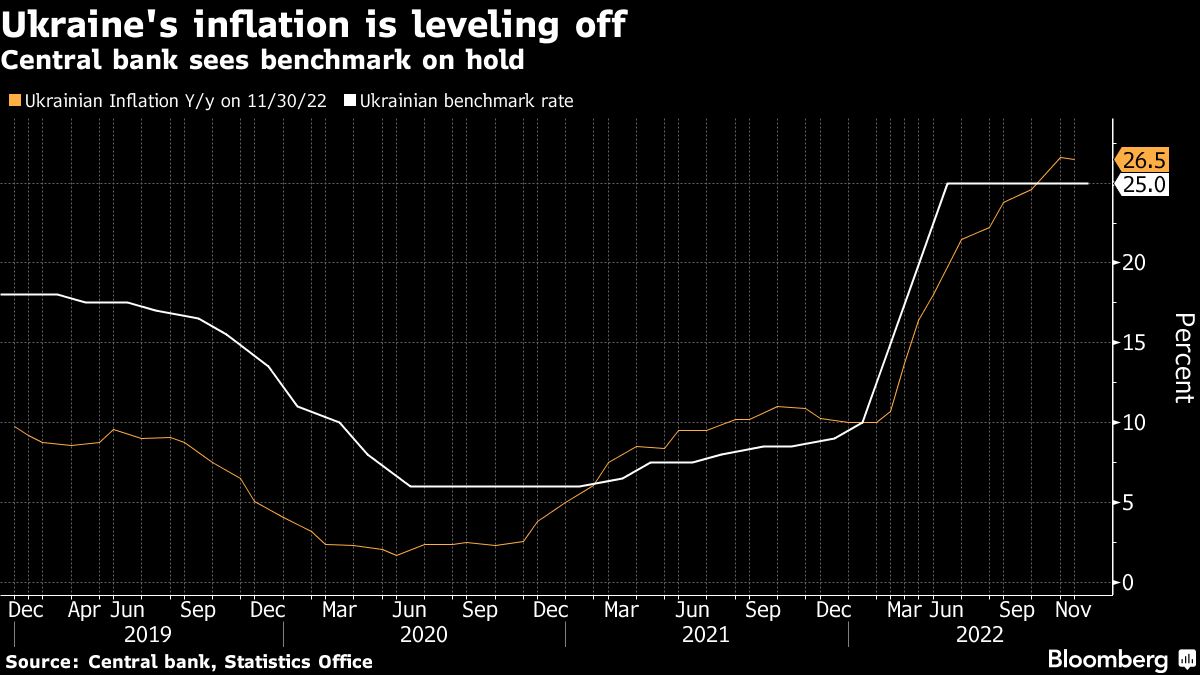
(Bloomberg) — Ukrainians’ resilience is helping arrest a plunge in economic growth, and inflation is accelerating slower than expected in the face of Russia’s campaign to destroy the nation’s energy infrastructure, the head of the central bank said.
Most Read from Bloomberg
Households and businesses have kept working and avoided spreading panic in the currency and banking markets, in a show of resistance as the war enters its 11th month, National Bank of Ukraine Governor Andriy Pyshnyi said in an interview. That may be enough for the economy to level off or grow slightly next year, after a more than 30% contraction this year, he said.
“We see that the economy — and this is an amazing thing — shows adaptability, resilience and flexibility,” Pyshnyi said in his office in downtown Kyiv last week as air-raid sirens sounded across the capital. “Ukrainians are modeling unique behavior in unprecedentedly stressful situations.”
Even with the Economy Ministry questioning whether next year’s growth forecasts will materialize, Pyshnyi said there is reason for optimism. He attributed a slower-than-expected decline in the third quarter to the efficiency of air-defense systems, relatively quick repairs to the power grid, and the unbreakable will of the people.
In the best-case scenario, the central bank sees the economy expanding as much as by 1% next year, matching the International Monetary Fund’s outlook, according to Pyshnyi.
“We’ve already discussed that this resilience driver should be taken into account” by the central bank’s research staff, he said. “We are kind of a laboratory” that the world can study to improve forecasting, he said.
One indication that households and business are learning to cope with the war’s impact is monthly increases in payment-card transactions despite increasingly frequent power outages, Pyshnyi said. Another is the number of diesel generators imported this year. Some 500,000 are helping the country continue working in the face of hours-long blackouts, according to the Prime Minister Denys Shmyhal.
Even with the higher cost of using diesel generators, year-end consumer inflation will probably come in at about 28%, below the current 30% forecast, Pyshnyi said.
The “tendency toward improvement,” however, is no reason to cut interest rates yet, he said, as the monetary policy committee has a unanimous understanding that the balance of inflation risk is upward. Price growth is likely to accelerate in the first quarter, before starting to slow in the second quarter, he said.
“As of today, we don’t see grounds for revising the key policy rate in the coming four months,” he said.
A key driver for the economy next year will be unlocking billions of dollars in loans from the International Monetary Fund, he said.
The government in Kyiv plans to work with an IMF mission in February and move to review the provisional program the following month. Part of the discussion is whether the Washington-based lender will stick to its tenet of not lending funds to countries at war. Pyshnyi said there was a chance to come to an agreement.
“The discussion taking place now within the International Monetary Fund gives us optimism,” Pyshnyi said. “We are now rewriting rules. This full-scale war should force a rethinking of regulations and approaches not only in international financial organizations, but also in international politics.”
–With assistance from Olesia Safronova.
Most Read from Bloomberg Businessweek
©2022 Bloomberg L.P.




